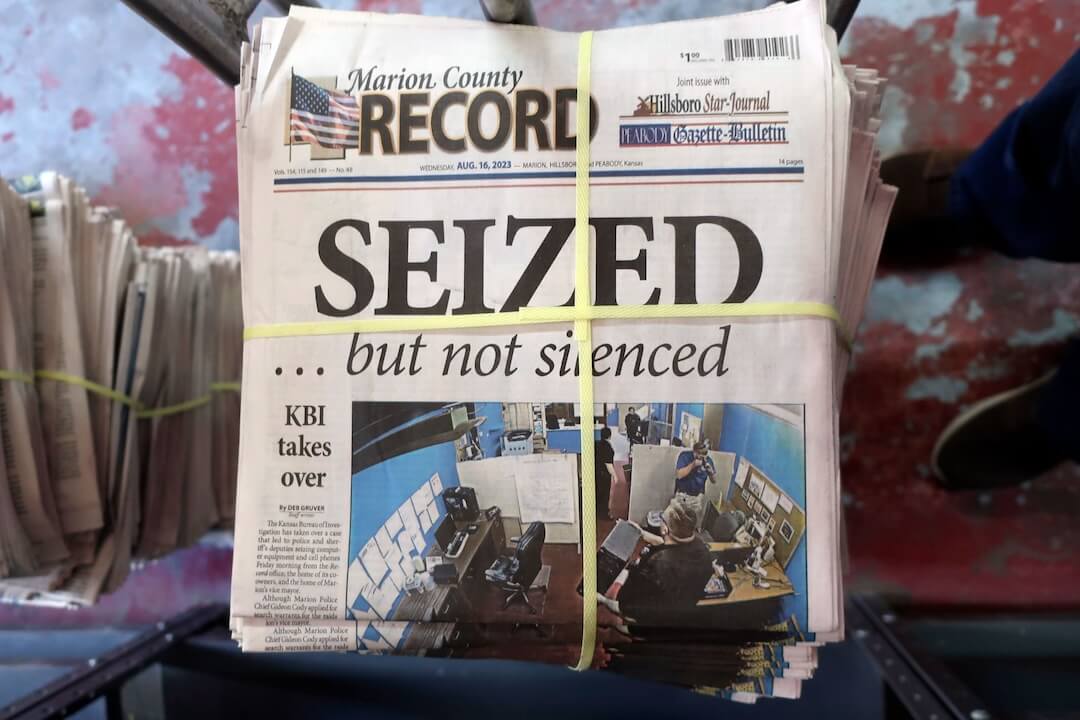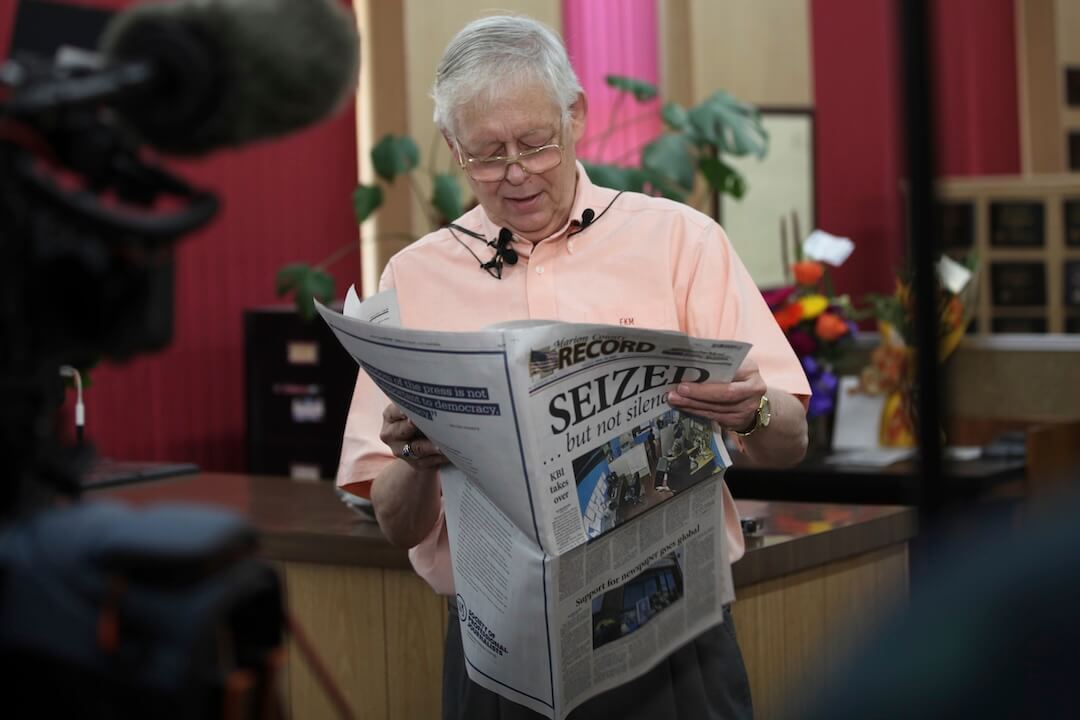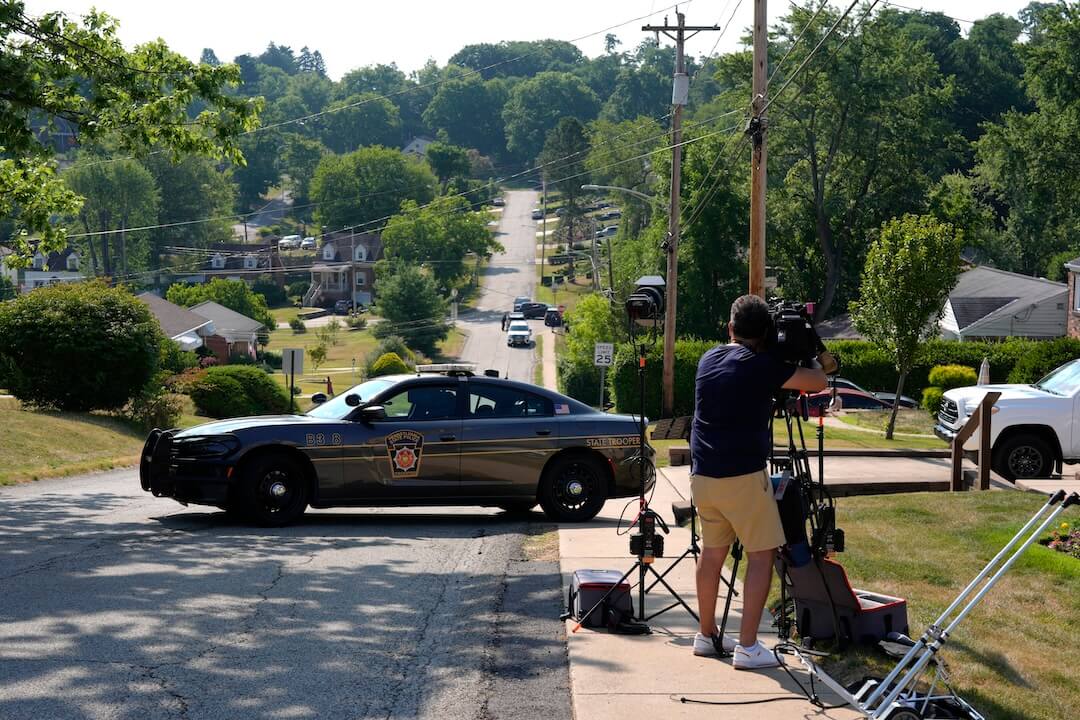This article was originally published on Northwestern University’s Medill Local News Initiative website and is republished here with permission.
The Marion County Record in Marion, Kansas, a city of fewer than 2,000 people, hit the national spotlight last August when the town’s police raided the small, weekly newspaper’s office and publishers’ home and, in the course of lengthy searches, seized computers and cell phones. Marion County Record publisher/editor Eric Meyer’s 98-year-old mother, Joan Meyer, was in her home during the police action and died the following day.
During the raids, Eric Meyer told officers, “You’re going to be on national news tonight.” His prediction came true, as reporters across the country covered the story and weighed in on an apparent breach of journalists’ constitutional rights.
Gideon Cody, Marion’s police chief at the time, justified the action, saying police believed the newspaper and one of its reporters potentially had committed identity theft while gathering information about a restaurateur’s driving records. Eric Meyer countered that the raids were retaliation for critical coverage of city officials, including a story about Cody that had yet to be (and still has not been) published.
The county’s top prosecutor withdrew the search warrants days later, citing “insufficient evidence” to link “this alleged crime and the places searched and the items seized.” Marion Mayor David Mayfield suspended Cody for his actions in late September, and the police chief resigned the following week.
Since then, three Marion County Record current and now-former employees have filed suits in response to the police action, and on April 1, Eric Meyer, his mother Joan’s estate and the Marion County Record sued the city of Marion, its former mayor and police chief plus other officials. That federal lawsuit accuses the “co-conspirators” of violating the First (freedom of the press) and Fourth Amendments (protection against unreasonable searches).
“Eric Meyer and the Record bring this lawsuit to seek justice for the intolerable violation of their constitutional rights and the constitutional rights of Joan Meyer, and to deter the next crazed cop from threatening democracy the way Chief Cody did when he hauled away the newspaper’s computers and its reporters’ cell phones in an ill-fated attempt to silence the press,” the lawsuit states.
It also notes that Joan Meyer told the officers in her home: “You know, if I have a heart attack and die, it’s going to be all your fault.”
Before returning to his hometown to run his family-owned newspaper, Eric Meyer had been an associate professor of journalism at the University of Illinois Urbana-Champaign for 25 years and previously worked in multiple capacities at The Milwaukee Journal (now Journal Sentinel). In this conversation, which has been edited for length and clarity, Meyer speaks from his newsroom about his and his family’s long history with the Marion County Record and the current state of the paper, its legal conflicts and journalism itself.
Mark Caro: How long have you worked at the Marion County Record?
Eric Meyer: I started working here in fifth grade, but then I left, and I went together with my parents and bought the place in ‘98. I was still teaching at U. of I., and I would come down on spring break, summer, break, winter break, fall break, all the breaks, and visit and sometimes work here. I came in 2020 at spring break, and I couldn’t go back (to campus because of COVID-19). So I stayed here and taught my classes from here for the rest of the semester and for all of the next year. When I heard that we were going to still have online classes in the fall and some weird hybrid — half of it was online, and half of it was in person — I said, “Enough of this. Online sucks. Nobody’s learning anything.” I said I could retire, so I did.
Caro: What were your parents doing at the paper?
Meyer: My dad was the editor and publisher, and my mother was a copy editor, community news editor. He’d been here since ’48, so he’d been here forever. We bought it in ’98 because he was getting ready to retire, and he was helping the Hoch family that owned the paper. He’d come to work for Wharton Hoch, and Wharton Hoch died in the ‘60s, and (my father) just stayed on for him and ran the paper after that. But the Hoch family was going to have to sell it because my father was retiring, and they looked around to see, gee, who can we sell it to? And they found somebody, (a company that) became GateHouse, which became the modern Gannett, and we didn’t like that idea, so we decided to buy it.
The Hochs gave us a good deal on it, and my father turned down a bunch of money to do it because the company that was wanting to buy the paper was going to give him a noncompete contract, which was probably worth as much as the paper was. So we took it over, and he worked for another five or six years and then retired completely and eventually passed away. But my mother kept working. She worked one day a week all that time.
Caro: So your father had been at the paper for 50 years before you bought it?
Meyer: Oh, yeah. They were well rooted. They moved into the house that now I live in the day before I was born. And I’m 70.
Caro: Many months after the police raids, no charges have been filed, but there’s also been no exoneration of you, right?
Meyer: We’re pretty sure we’re clear, but we haven’t technically been cleared.
Caro: Did they return your cell phones and computers and whatever else they confiscated?
Meyer: Yeah, they did. Our deadline is Tuesday night, we publish Wednesday morning, and they kept them until Wednesday afternoon of that week. They gave them back to us, but then our attorney said he wanted to have them forensically examined to determine whether anybody had done anything to them, so it was another week of forensic examination after that before we actually got them back.

A stack of the Marion County Record sits in the back of the newspaper’s building, awaiting unbundling, sorting and distribution on Aug. 16, 2023. (AP Photo/John Hanna, File)
Caro: At the time, you mentioned the shield law (which is meant to protect journalists from disclosing their sources). Is there any fallout from that being violated?
Meyer: No, because there’s really no penalty for it. We’re pretty sure that they violated the terms of their search warrant by seizing our items, because these weren’t authorized, only preliminary searches to determine what could be seized. And they just took them all.
So nothing has happened, except the fact that like two months afterward, they finally suspended the police chief, and then he quit two days after that. But other than that, there’s been no change, which is partly why one of our reporters quit, because she couldn’t deal with the stress of still dealing with the same people and trying to report with a judge and a county attorney and a police chief and a sheriff, all of whom have done bad things to us.
Caro: What’s the status of the lawsuits filed in response to the raids?
Meyer: Deb Gruver, the reporter who left us, filed her suit first, then Phyllis Zorn. Deb contends that her hand was injured when the police chief yanked her phone out of it. And then he went over afterward, according to the body camera (footage), and (said) it really made his day to be able to yank her phone away. But Phyllis Zorn — another of our reporters who suffered a seizure disorder but hadn’t had seizures in years, has had several since then and some accompanying short-term memory problems and so on — she has filed a suit. Cheri Bentz, our office manager who was here at the time, has filed a suit.
On April 1, I and the company filed a suit, and the estate of my mother filed a suit. There will be at least one more suit coming after that. This is all federal stuff for First, Fourth Amendment and Privacy Protection Act violations. We also had to file a notice under Kansas tort reform law, giving them 120 days to respond to a whole host of potential state court lawsuits, including wrongful death, that we’re going to be bringing.
Caro: Do you hold the police responsible for your mother’s death?
Meyer: Absolutely. They had seven cops standing in her house for two-and-a-half hours. It was such overkill, literally. She warned them (about having a fatal heart attack). They just stood there. Even afterward, the guy who’s now the interim police chief wanted to have her arrested for resisting, for interfering with law enforcement, because she was dangerous to them with her walker. You take a 98-year-old person who’s lived in a house for 70 years, and you stand there for two-and-a-half hours and rifle through their stuff and don’t let them go anywhere near it or see what you’re doing, it’s going to upset them. And it did upset her.
She would not eat. She would not drink. She would not go to bed that evening. She just kept (saying), “Where are all the good people? How can they do this? How can they stand by and let these jackbooted Hitler’s forces come in and do it?”
She finally went to bed at something like 6 or 7 a.m. I let her sleep till a little after noon. And I finally got her up, she went to the bathroom, and I said, “You should probably eat something. You haven’t had anything since Thursday night.”
She said, “Well, I’m not sure I want to.”
I said, “Yeah, you need to have something. You want to have me fix it in the kitchen? In the dining room? In your bedroom?”
And she says, “I don’t know, I don’t feel too —” and died right then.
The coroner who came over, who had actually been her family physician for many years, noted in his death report that the stress from the raid was a serious contributing factor. So it’s pretty well documented. I guess they call it broken heart syndrome; that’s very common among older people who feel that their whole life’s work has somehow or other been for naught, and she definitely felt that way. They very often just die of sudden cardiac arrest.
Caro: This is stating the obvious, but that must be really distressing for you as the son.
Meyer: The only redeeming thing months later is that I kept telling her at the time, “You know, this is just bullies. It’s just a bunch of bullies. And bullies eventually do one thing too many. They push it too far, and they get their comeuppance at that point.” She kept saying, “Yeah, but I won’t be alive to see it.”
But when you’re 98 — you know, as she knows and everybody knows — it’s not that much longer that you have around here. And it’s pretty rare for a person who’s 98 to be able to go out and have their death mean something to other people, to be a meaningful death, not just fading away into that good night, but to rage at the dying of the light. She got that opportunity, and knowing her as well as I do, I kind of think she would appreciate that. She’d think: Well, I had to go somehow. I might as well go in a way that furthered my life, that was consistent with what I’d done the rest of my life.
Caro: When the police were raiding your house, you said, “You’re going to be on national news tonight.” Have the fallout and attention from this been what you expected, or did it surprise you?
Meyer: Well, it always surprises you. I knew that the issue was one that serious journalists would pay attention to, so I knew that there were some serious publications that would talk about it. To be honest with you, part of what made us hit and get so much attention was the video of my mother. That was the human face. That was what people could understand. It wasn’t now an issue of what did the law say about this, what does the law say about that? It was, look at that 98-year-old woman. Look at what she’s fighting for.
What I didn’t think would happen was the public response to it. We were just overwhelmed with the number of people calling us, writing us, sending us food, sending donations, subscribing to the paper. We had tens of thousands of email messages, and not a single message was negative toward us. And they came from everybody, from all sides of the political spectrum, from the libertarians to the communists to the militant Christians to whatever you happen to have — and disproportionately, oddly enough, from people in the law enforcement community. I think the police are tired of being accused of wrongdoing, and there certainly has been a lot of wrongdoing by police, but there are good ones out there. And they thought: Oh, crap, another thing that we’re gonna get accused of? And they’ve been very supporting.
This town is the 122nd largest town in Kansas. We serve the whole county, which is the 35th largest county in Kansas. As of this week, we have the eighth-largest paid circulation in the state because of all these people who have bought subscriptions to our paper just to support us. Now will this last? Of course not. Is it everybody? Of course not. Is it enough to make an industry work off of? I think so.
Caro: What has the response among journalists and the industry been like?
Meyer: “What do you need for help?” It’s been entirely supporting. We would have been left hanging in the wind if journalists hadn’t come that Friday to start covering our story and pointing this out. When I told the officers, ‘This is going to be all over the news; you’re gonna be on the front page of The New York Times,” they (said), “Yeah, sure.” And in fact on body cam footage later on, they said, “Yeah, he said this was gonna get attention, ha ha ha ha ha.” They didn’t realize it. But it’s been an outpouring and a very welcome one. Like my mother said, “Where are all the good people?” Well, they’re coming now. They’re coming now.
Caro: How is the Marion County Record a different paper now from what it was before last August?
Meyer: Well, we’re down. We were looking to hire a person last August, and we never did get a reporter hired. We lost a reporter. We lost my mother, who was working a day a week. We haven’t been able to fill any of those vacancies and not for lack of trying. We just aren’t getting any applicants.
There are Gannett newspapers and CherryRoad newspapers surrounding us. We pay more than all of them do. It’s partly (people) don’t want to live in a little town, partly they don’t want to live in this little town. Even though my generation would say, “Oh, I can live in a town where they raided them, and this is gonna be great,” that isn’t the way people think anymore. They want to fit in and have plenty of, you know, “me time” and “I’ve got to have my work-life balance.” We don’t have any work-life balance. We have work, and that’s life. (laughs) There’s no balance to it right now. A lot of people just don’t like that idea.
We’ve got enough staff. We can deal with it. We’re trying. But we don’t think that the paper is as good as we could have it, because we see every week stories that we could, if we had more time, pursue.
But I think we’re less likely to take shit anymore. Basically, they attempted to intimidate us, and they had the reverse effect. They strengthened our resolve to find out what’s wrong. I think it’s made us more insistent that we need to do more in terms of investigative work. We need to do more in terms of work that might be labeled negative and might not make us popular.
In some cases, they picked on the exact wrong person because I don’t take a salary. I should never say this, but I don’t care about money. I get plenty of it from being a retired professor, and I also get a pension from The Milwaukee Journal for the years that I was there. I don’t need any money, so I don’t take a salary. I will take a bonus at the end of the year if we make one, but I don’t take a salary weekly. I don’t care about the social nature of it. I don’t play golf. I did once; I shot a 72, made it through the third hole. So there isn’t a whole lot they can do to me. If they shun me, fine. If they want to boycott our ads, fine.
I came here with a goal in mind that I’d been preaching for many years in the classroom: that we needed to forget all the obsession we had with the silver bullets of technology. “Oh, everything will be fixed with journalism if only we can harness this” or, “If only we can live tweet more” or, “If only we can” whatever else. Now it’s going to be, “If we can use AI greatly.” Whatever. We need to stop looking for silver bullets and realize journalism is journalism. And if you improve the journalism, that’s the best way to improve your product.
So I came here before the raid with the idea that we were going to do less expected stuff and more unexpected stuff. That’s our terminology for it. We don’t call it “enterprise” or whatever. “Unexpected” is what people want in their newspaper. It’s news. “New” and “news” are the same word for reasons.
We also tried at the same time to do things with advertising so that we weren’t just going to sell space anymore; we were going to try to help (advertisers) market their products, design them well, do everything as best as we can and see what happened to the newspaper. Well, before the raid, our circulation was rising; our ad revenue was rising. There aren’t many newspapers that that was true of. Our circulation has risen precipitously since then, but we were doing OK before that.
Caro: What’s the difference in circulation from before to now?
Meyer: We are up at around 5,500 paid circulation. We were down around 2,000 before.
Caro: Often when there’s some action against journalists, there’s the fear of a chilling effect. Do you sense anywhere there’s been a chilling effect, or is it really the opposite?
Meyer: There might be other places, I don’t know. It certainly is not here. Like I said, I lost a reporter who just the stress of working here wasn’t for her. Why do you want to get into a business where people might not like you, where people might take action against you?
Most people should — and most people need to — think of this as a cause. This is a calling. We’re like priests, rabbis and other clergymen and social workers and good cops, because there are good ones, and a lot of other people who do things not because they’re easy, not because they make a convenient job that lets them do whatever they want, but because their community needs it. And that’s the people we have to attract.
(The challenge is) how we find them, and then we have to figure out once we find them, how we train them, so that we can get them the experiences they need. That way we have a robust press. Whether it can survive all the various miscellaneous hedge funds that want to come up and snap them up, whether it can survive other things, I don’t know. If I were master of the universe, first thing I would do — forget whether we’re going to ban TikTok or not, let’s just ban all of social media. I think it’s destroying American democracy.
Caro: You mentioned that you’re 70. How long do you plan to keep doing this? And do you have a succession plan in place?
Meyer: No, and that’s much to my discredit. That’s one of the things I keep worrying about. The office manager here doesn’t think she has the ability to run the paper, but I do, and I am going to try to bring her along, maybe. Find somebody else, maybe. I’m looking for some young people that might be able to come here and might get enchanted with it. I’ll basically give the paper away.
But this is not alone in small towns. We have a lawyer in town, the only remaining practicing lawyer in the county, who wants to retire, and he’ll give his practice to somebody who will come here. And I would probably do the same thing with the newspaper or put some token cost on it; people appreciate things if it has a value to it. But how long do I plan to continue? As long as I can continue.
Hey, my mother made it to 98. I don’t think I will. But I can keep trying.






